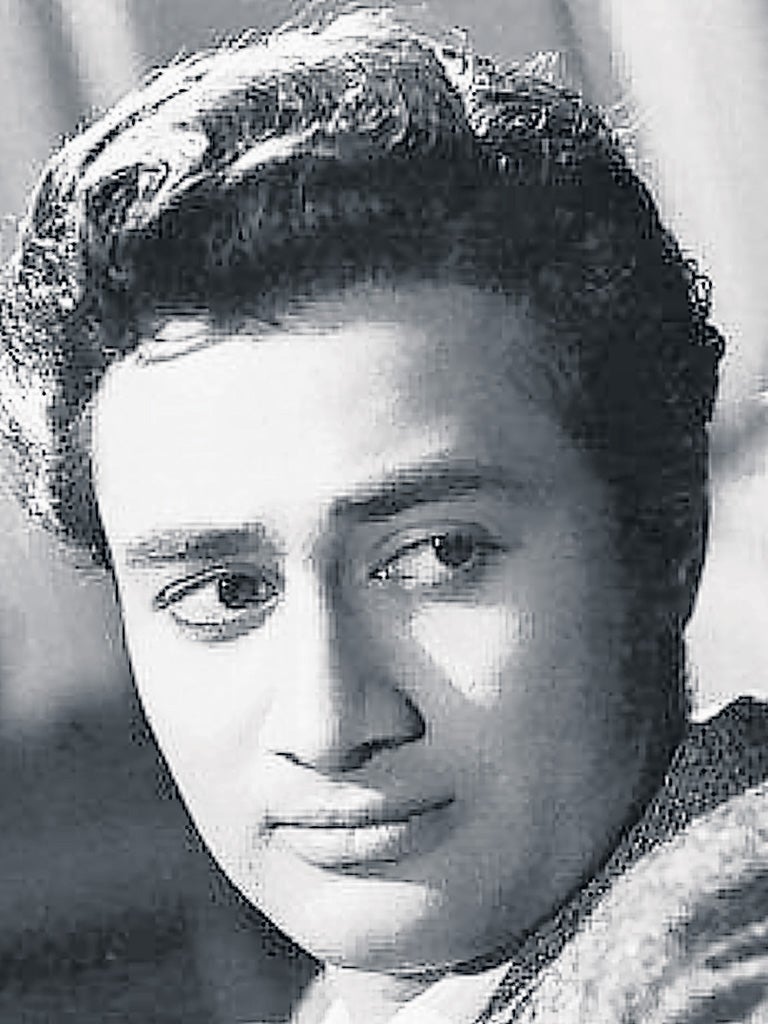Dev Anand: Actor and director who towered over India's film industry

The death at 88 of Dev Anand, the Bollywood actor-writer-director-producer, marks an end to a particularly spectacular era of cinema history. For almost 65 years Anand was an integral part of the Indian film industry and he had huge influence beyond it. Indian college students of the 1960s and '70s emulated his style of speaking and of delivering amorous dialogue; his hairstyle, his clothes and even his walk were imitated. College girls secreted his photograph under their pillows. He was often compared with Gregory Peck but, being Dev Anand, he declared that he was Dev Anand and Peck was Peck. No one could accuse Anand of being unduly modest. (The two men did once meet, and by all accounts got on well.)
Born Dharam Dev Anand, he shortened his name to Dev Anand ("Deity of Supreme Happiness"). His father was a successful upper-caste Hindu lawyer in the Shakargarh part of the British-ruled Punjab Province. Anand was educated at Lahore's well-known Government College and read English.
He failed to get into the Indian navy and went to Bombay, where his elder brother Chetan was making waves as a member of the Indian Peoples' Theatre Association (IPTA), a socialist and secularist arts movement. By the mid-1940s the IPTA was a force to be reckoned with as it was headed by leading intellectuals such as Khwaja Ahmad Abbas, Krishan Chander, Rajinder Singh Bedi and Sardar Jafri.
In 1946 Anand got his first lead role, in the film Hum Ek Hain ("We are One"). The very next year India was partitioned and Shakargarh became a part of the Islamic state of Pakistan.
The Bombay film scene in the late 1940s and '50s was dominated by north Indians, mostly Punjabi Hindus and Punjabi Muslims, most of whom had been born in the areas that later became West Pakistan. They spoke their native Punjabi among themselves, but found themselves having to adjust to the new conditions of the India-Pakistan conflict and an increasingly Hindi (as opposed to Urdu) content in films. The Anand brothers, Chetan, Dev and Vijay, adapted to the changed conditions with amazing ease, as did the dynasty of the Kapoors, Hindu Pathans with origins in Peshawar.
Anand's break came when he was cast opposite the singing star Suraiya in no less than seven films, in allof which she had top billing. While shooting a romantic boating scene,the boat capsized and Anand, being a good swimmer, rescued Suraiya. One thing led to another, the pair fell in love, Anand proposed and Suraiya happily accepted. But her Muslim family objected vehemently, and the marriage never took place.
In the meantime Dev's brother Chetan had discovered Mona Singha, who came from a leading Punjab Christian family and gave her the screen name Kalpana Kartik. The 1951 film Baazi ("The Gamble") directed by Guru Dutt, starred Dev Anand, Geeta Bali and Kalpana Kartik. Inspired by Hollywood's Gilda, which had starred Rita Hayworth, it was a box-office hit and became an industry trendsetter. More successful films followed, as did the marriage of Dev Anand and Kartik; in Bombay, as in Hollywood, celluloid and real life were often intertwined. The couple had two children, Suneil and Devina, and Kartik gave up acting to take care of them. Stories of her husband's ceaseless romancing never appeared to disturb her.
Anand was always alert to new ideas and cinematic possibilities. He managed to convince RK Narayan, the strict South Indian Brahmin who wrote fiction in sensitive English, that his novel The Guide should be made into a film. Anand collaborated with the American Pearl Buck in the making of the US version and the film Guide, in which he starred, was released in 1965, directed by his brother Vijay, who was to become a notable director in his own right.
Dev Anand played the hero in 114 Indian films in all. Among the many awards he garnered over the years were the Dadasaheb Phalke (India's version of an Oscar) and being invested a Padma Bhushan of the Indian republic.
In 1971 he directed Hare Raama Hare Krishna, a blockbuster which dealt with the hippie culture in Khatmandu and launched the career of the futuresuperstar, Zeenat Aman. That same year he starred in Tere Mere Sapne("Our Dreams"), an adaptation of AJ Cronin's novel The Citadel, again directed by Vijay.
Always keen to encourage talent, he put his money into worthwhile projects through his production company Navketan ("Newness"). Recently Channel 4 screened a number of his films, among them the 1962 hit Hum Dono ("Both of Us") in which he played a dual role, and which introduced the enchanting actress Sadhana. His most recent film, released a few months ago, was Charge Sheet.
Many Indian actors have become politicians, but Anand's only involvement with politics was when he fiercely opposed Mrs Gandhi's draconian Emergency Rule in the mid-Seventies. Perhaps his crowning moment was when he accompanied the Indian Prime Minister, Atal Bihari Vajpayee, on his peace mission to Lahore. Thousands of Pakistanis wanted to shake his hand and touch him while ignoring Vajpayee and their own President Musharraf.
In 2007 Anand published Romancing with Life, a frank and revealing memoir. He died at a hotel in London, which he was visiting for a medical check-up, after a cardiac arrest.
Dev Anand, actor, director, producer: born Shakargarh, Punjab, India 26 September 1923; married Mona Singha (one son, one daughter); died London 3 December 2011.
Join our commenting forum
Join thought-provoking conversations, follow other Independent readers and see their replies
0Comments